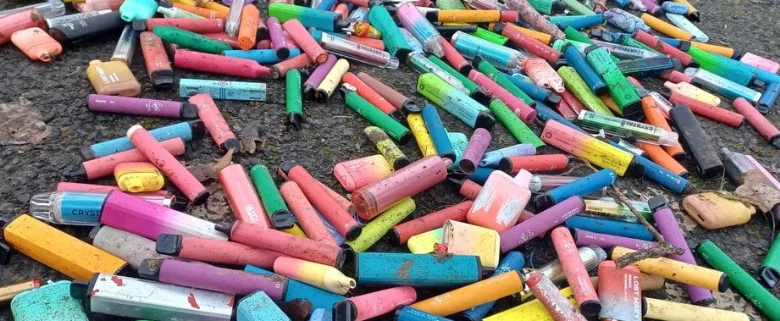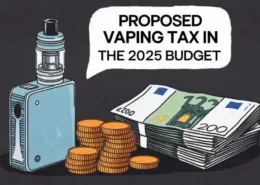Disposable Vapes Environmental Impact: A Growing Concern and the Road to Regulation
In recent years, disposable vapes have emerged as a convenient and popular alternative to traditional cigarettes. However, their rapid rise in popularity has not come without consequences. The environmental impact of disposable vapes is now a pressing concern, as these single-use devices add to the ever-growing issue of waste and pollution. This comprehensive article delves into the problem of disposable vapes littering our streets and landscapes, their contribution to e-waste, and the steps governments and the industry are taking to regulate and mitigate their environmental footprint. Read on to learn about the current state of disposable vapes, their impact on our planet, and the potential solutions that could help protect our environment for generations to come.
The Rise of Disposable Vapes
Just an ordinary street in an ordinary town. OK, it happens to be Aberdeen in northeast Scotland, which is technically a city, and its inhabitants might object to it being called ordinary, but in one respect it could be almost any street in any town anywhere in the so-called civilised world. The pavement is perhaps marked with fewer chewing-gum blots than they would once have been, and there are surely fewer cigarette stubs in the gutter. But among the crisp packets, fast food wrappers and beer cans a new breed of litter is proliferating, arguably a far worse pollutant than any of those yet mentioned.
The Lost Mary Dilemma
The name on the packet lying idly in the morning sun, Lost Mary, seems somehow appropriate. But it’s not the packet, made of readily biodegradable card, that’s the trouble – it’s the lost contents. Which, of course, might easily have been of some other brand.
Even if that disposable pod isn’t littering a gutter somewhere but has gone to landfill, that’s a piece of electrical equipment discarded after being used just once. A device including small but irrecoverable quantities of various metals, a larger quantity of plastic, and a lithium battery – which is not only a small but not totally insignificant fire risk as it degrades, but also adds to the globally troubling environmental damage being done by lithium mining, especially in South America.
If it’s lying on a street, or a beach, or among the rising tide of litter washing up by the side of any road, it will be leeching heavy metals, valuable copper, gold, lithium and bits of plastic into the environment.
Read more: Elfbar Lawsuit in UK
The Bigger Picture
Each discarded vape may not pose much threat to town or countryside, but this is just one among an estimated 1.3 million that are chucked away every week in the UK alone.
The State We’re In
It is, of course, just one part of a huge global problem of waste and environmental pollution that stems from almost everything people do – from smartphones to junk mail, plastic wrapping of vegetables to ever bigger and “cleverer” cars.
Disposable Vapes: Pros and Cons
And yes, as many vaping advocates will argue, disposable vapes may help millions of smokers quit a deadly habit. Yes, too, as the anti-vape activists will say, they may get millions of kids hooked on nicotine. Their ready availability may also be damaging the market in reusable vaping devices and e-liquid refills, which arguably provide all the benefits to far less detriment.
Read more: The advantages of disposable vape
Calls for Bans and Regulations
All this is background to the growing calls in many countries, including Scotland, for a ban on disposable vapes. And it is also closely tied to moves in both the EU and the US towards environmental regulations that – while not related solely or specifically to the e-cig and tobacco sectors – are likely to have a major impact on them.
Legislation at State Level
In the US, typically, most of the legislative action is taking place at state level. While New York seems to be alone so far in seriously considering banning single-use e-cigarettes, bills on the table in other states cover recycling, packaging, waste management, sustainability reporting, the “right to repair”, and restrictions on batteries and plastics, any or all of which could have repercussions throughout the e-cig industry, from manufacturer to vaper.
Read more: Vaping Laws in UK
EU-Wide Ban on Disposables
Calls emanating increasingly loudly from Germany, Belgium and France for an EU-wide ban on disposables may fall on hearing-impaired ears in Brussels. And in the former-EU UK, advocates were disappointed when a proposed ban on disposable vapes was not included in the UK’s Tobacco Control Plan released in early 2023. However, the plan did emphasize the government’s commitment to review the evidence and consider further regulations on e-cigarettes.
Asian Markets Follow Suit
Asia, another major market for vaping products, is also witnessing a growing concern over the environmental impact of disposable vapes. Countries such as India, Japan, and South Korea are all discussing the possibility of stricter regulations or outright bans on disposable e-cigarettes, although no concrete measures have been implemented yet.
The Road to Regulation
The growing concern over disposable vapes and their impact on the environment is leading to increased scrutiny and potential regulation in various regions around the world. If these regulations are implemented and enforced, they could lead to significant changes within the vaping industry. Manufacturers may need to shift their focus to reusable devices and e-liquids, and consumers could face a more limited selection of products.
Education and Awareness
In the meantime, increasing public awareness of the environmental impact of disposable vapes is key to reducing their usage and subsequent pollution. Campaigns encouraging proper disposal and recycling of vape products, as well as promoting the use of reusable alternatives, can play a crucial role in limiting the damage caused by disposable vapes.
Future Innovations
The vaping industry has an opportunity to be proactive in addressing these environmental concerns. By investing in research and development, companies can create innovative solutions that reduce waste and pollution associated with disposable devices. This could include designing more easily recyclable products or creating biodegradable materials for use in e-cigarettes.
Conclusion
The issue of disposable vapes and their environmental impact is becoming increasingly difficult to ignore. With growing public awareness and potential regulatory changes on the horizon, the vaping industry must adapt to the challenges it faces. By prioritizing sustainable practices and product innovation, the industry can work to minimize its environmental footprint and ensure a more responsible future for vaping.
FAQs
1. What is the main environmental concern with disposable vapes?
The primary environmental concern with disposable vapes is the waste they generate. Since they are designed for single use, they contribute to the growing global problem of e-waste, as well as litter in public spaces. Additionally, discarded vapes can leach hazardous chemicals and metals into the environment.
2. What can consumers do to minimize the environmental impact of vaping?
Consumers can choose to use reusable vaping devices and e-liquids instead of disposable vapes. Additionally, they should properly dispose of or recycle their vaping products to minimize waste and environmental pollution.
3. How are governments around the world addressing the issue of disposable vapes?
Governments in various regions, including the European Union and the United States, are considering or implementing regulations to address the environmental impact of disposable vapes. These measures may include banning disposables, promoting recycling, or enforcing stricter waste management practices.
4. How can the vaping industry respond to environmental concerns?
The vaping industry can invest in research and development to create innovative solutions that reduce waste and pollution associated with disposable devices. This may involve designing more easily recyclable products or using biodegradable materials in their manufacturing.
5. What role does public awareness play in addressing the environmental impact of disposable vapes?
Increasing public awareness of the environmental impact of disposable vapes is essential for reducing their usage and subsequent pollution. Education campaigns can encourage proper disposal and recycling of vape products and promote the use of reusable alternatives.
- Spain Plans to Ban Smoking and Vaping on All Terraces by 2027 - August 7, 2025
- Maldives Issues MVR 127,000 in Vape-Related Fines in July - August 7, 2025
- Alabama Lawmaker Proposes Ban on Vaping in Public Places - August 7, 2025








